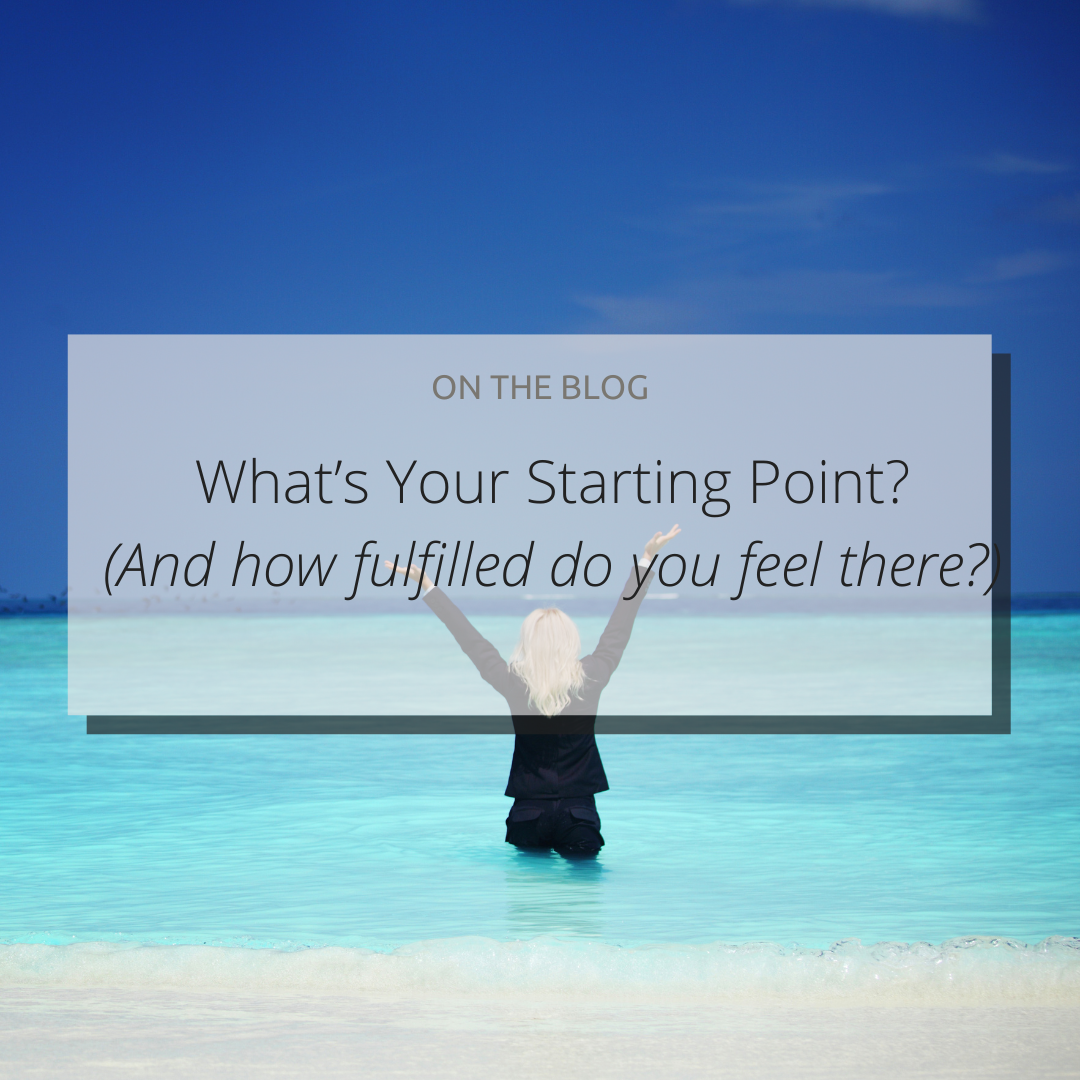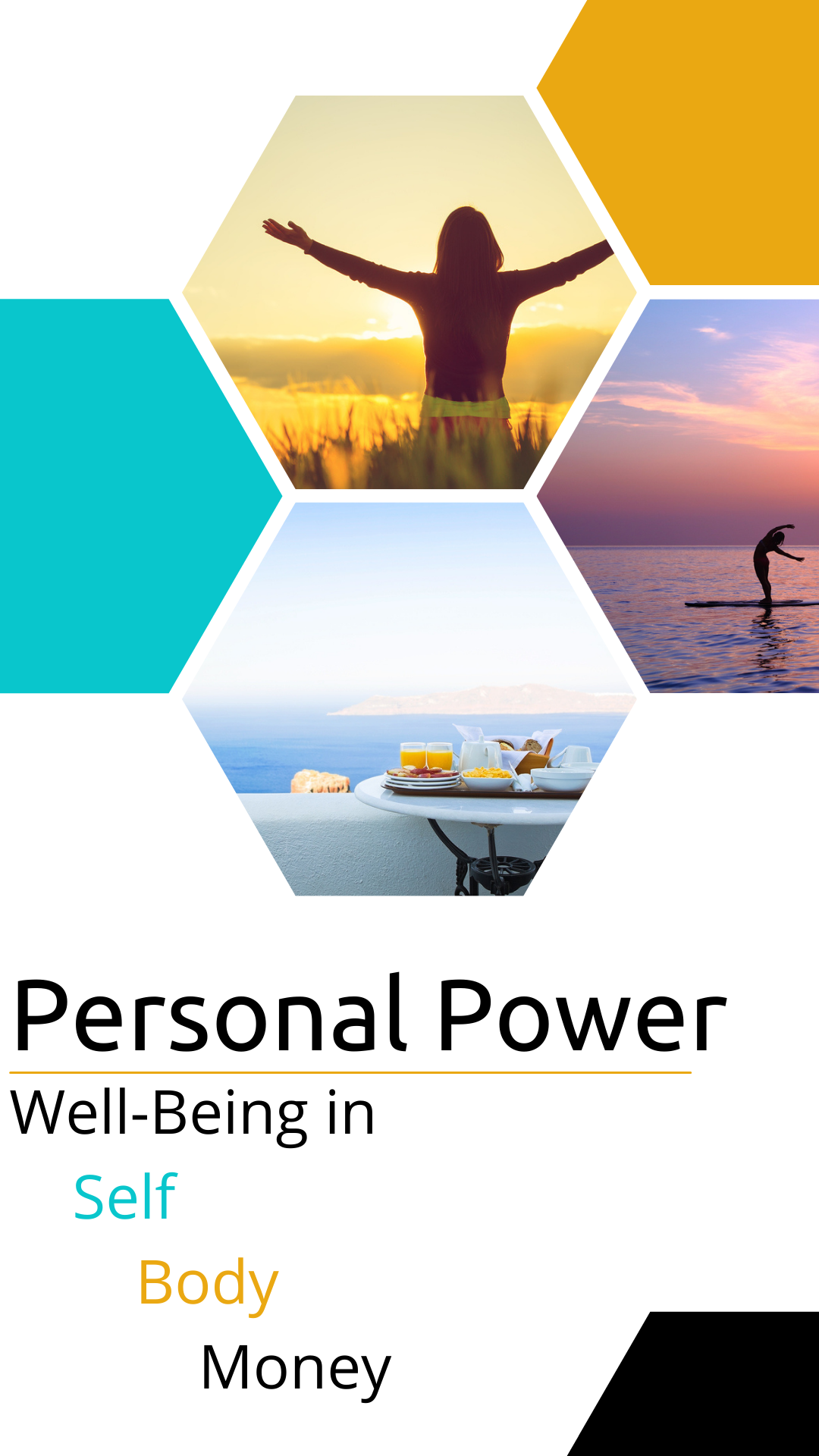
What’s your starting point (and how fulfilled do you feel there)?
Shifting Direction
Personal empowerment was not a focus in my life at the time, and I was definitely not a model of well-being. I studied finance at university and spent the first 11 years of my career working for Fortune 500 companies. I disliked and avidly avoided exercise and had absolutely atrocious eating habits. While my finances were in decent shape thanks to family role models, my choice of profession (finance), and my security-minded nature, my inner sense of well-being had, as we would say in corporate speak, a lot of opportunity for improvement (not that I gave it much thought until my mid-30’s). In other words, my starting point was very different from where I am now. So, how did I get from there to here? Step by step.
The Journey to How You Want to Feel
That is how life happens, and goals are achieved. Step. By. Step. And which is also the purpose of this blog or, as I think of it, a journey by words. To be with you and support you as you take each step. So, what is this journey that I am talking about? It’s the journey to how you want to feel. It’s the journey to what you want in your life – the more you want to feel and have in your life as you define that for yourself. That does not mean that how you feel now has to be bad. It does not mean that what you have in your life is not good. This is not a cup-half-empty-inspired journey. Instead, this is a journey of potential. It is a journey that recognizes that each day you have is an opportunity. Each day offers you a chance to do more of what makes you feel how you want to feel and helps you live as fully as you want to live. As you define that for yourself. So, even if you’re coming from a great place, a not-great place, or somewhere in between, this is your journey, and you get to decide what you want from it.
The Impetus for Change
So, what makes us not only decide that we want something different but that we’re ready to take action to achieve it? When we reach our more uncomfortable point. We change when not changing becomes more important than change itself. My change started when I hit my “more uncomfortable” point. We were living in Moscow, Russia, where we had transferred to for a work assignment with my husband’s company. It was an exciting time but a stressful one, too. Different things came to a head, and it finally became too big to ignore the fact that I did not feel the way I wanted to feel. I was not where I wanted to be in my life. This does not mean that how I felt was terrible or that what I had in my life was not good. That was not the case. There were many beautiful things in my life. However, when push came to shove, I realized I had neglected parts of me and my life that I could no longer ignore. Staying where I was became more uncomfortable than the change I wanted to feel and have in my life.
Your More Uncomfortable
So, what about you? What is your “more uncomfortable?” Think about your life. In what area of your life are you not feeling as good as you would like to feel and would like to feel better? What is the change you would like to feel and see in yourself? What change would you like to feel or see in specific areas of your life? As part of that, how fulfilled do you feel in your life?
What Is Fulfillment?
What is fulfillment? Fulfillment has been described as more than just an emotion but, rather, a state of being.¹ Fulfillment is defined as “the meeting of a requirement or condition.”² I like this definition because it leaves it up to you to define what that requirement or condition is, and that is important. This is your life. Your journey. And what you want from it – the requirements or conditions that are important for you to meet – is what matters. Results from a Pew Center Research survey that asked the question, “What makes for a fulfilling life?” showed that 71% of people most highly valued having an enjoyable career or job.³ Of those surveyed, women placed a higher value on this than men, with 74% saying it was extremely or very important, while 69% of men said the same.³ Having close friends was also extremely or very important, with 61% rating it as such.³ Other things – like having children (26%), a lot of money (24%), and being married (23%) – were not ranked as highly.³ Interestingly, men rated more than women highly being married (28% of men vs. 18% of women) and having children (29% of men vs. 22% of women).³ (Note that in addition to gender, marital status, parenthood, race and ethnicity, age, and partisanship also influenced results; read more in the article referenced below.)
Step 1: Assess How Fulfilled You Feel
What about you? What most supports a fulfilling life for you? Think about where you are more or less satisfied in your life. Consider your work, your personal life, your relationships, the activities you engage in during your leisure time, your lifestyle, your finances, and your personal well-being or how good you feel physically, mentally, emotionally, and spiritually. Ask yourself:
- How good do you feel in each?
- Are you satisfied with where you are in each? If not, what would you like to change or improve upon?
- What change in what area of your life would make you feel better or more fulfilled?
Note down your thoughts.
Step 2: Start A Journal
As we start this journey and as you reflect and take action, keep a journal. A journal can be a powerful tool as you take steps in your journey to achieve more of how you want to feel and what you want in your life. Research shows that journaling – expressive writing about one’s thoughts and feelings – has mental and physical health benefits, including greater clarity, self-connection, and overall well-being.⁴ It can help you become more aware of what influences your thoughts, feelings, moods, and behavior – ultimately, the quality of your life experiences and outcomes. It can help you gain perspective and highlight patterns that may keep you stuck in an area of your life that you want to address. The good news is that journaling is easy and takes only as much time as you want to give it. So, start a journal if you don’t already have one and use it as a supporting tool and outlet to support you as you progress in your journey. Pick a time when you want to journal and try to journal at that time every day (with flexibility, adjusting when you need to when you can’t journal when you planned to).
Step 3: Begin Your Journey
So, now, with your journal in hand, start your journey to the more you want to feel and have in your life by identifying where in your life you would like to feel better or more fulfilled. Consider what your “more uncomfortable” is – where staying where you are has become more uncomfortable than making a change. Identify the change you most want to feel or see in your life.
TAKE ACTION:
- Assess how fulfilled you feel. Review the different areas of your life. For example, consider the work you do, your personal life, your relationships, the activities you engage in during your leisure time, your lifestyle, your finances, and your personal well-being, or how good you feel physically, mentally, emotionally, and spiritually. Ask yourself the following questions:
- How do you feel in each area of your life?
- In what area of your life are you not feeling as good as you would like to feel or would like to feel even better?
- What is the change you would like to feel in that area?
- Start a journal (in a notebook, if you prefer to write, or on the computer or smart gadget), and use it as you progress on your journey to achieve the change you desire to feel or have in your life.
- Begin your journey. What change that you desire is most important for you to start addressing and why? What will it give you or allow you to feel that you don’t have or feel today? Commit to the change that is most important for you to feel or see in your life.
References:
1: Brown, Gregory Scott MD (2023, May 19). Happiness is fleeting. Aim for fulfillment. Retrieved from https://www.washingtonpost.com/wellness/2023/05/19/fulfilled-life-happiness-strategies/
2: Definition of fulfillment, from Oxford Lanagues. Retrieved February 26, 2024 from https://www.google.com/search?sca_esv=1afa8f061832541a&rlz=1C5CHFA_enMX817MX817&sxsrf=ACQVn09fMjc37B6Kg631sipnyLOyeIkLrA:1708952891141&q=fulfillment&si=AKbGX_okpkrXRdHQwZu4Fe0iRe3u9mEbYi5rAHON2nPt4STLRbh8vpZjn9E8gc2NXG5EMzZFSzn92nxLs6PNXtxez6Ev_PvRDtKuXPAfN65CIhStv_24TqI%3D&expnd=1&sa=X&ved=2ahUKEwikjI7QicmEAxWXMVkFHTTlDmoQ2v4IegQIHRAX&biw=1306&bih=636&dpr=2.2
3: Pew Research Center. What makes for a fulfilling life? Retrieved from https://www.pewresearch.org/social-trends/2023/09/14/what-makes-for-a-fulfilling-life/
4: Journaling Research
Carpenter, Siri (2001). A new reason for keeping a diary. Research offers intriguing evidence on why expressive writing boosts health. Monitor. September 2001, Vol 32, No. 8. Print version: page 68. Retrieved from https://www.apa.org/monitor/sep01/keepdiary#:
Murry, Bridget (2002). Writing to heal. By helping people manage and learn from negative experiences, writing strengthens their immune systems as well as their minds. Monitor. June 2002, Vol 33, No. 6. Print version: page 54.
Rodriguez, Tori (2013, November 1). Writing Can Help Injuries Heal Faster. Expressive writing may lead to faster recovery from injury. Scientific American. Retrieved from https://www.scientificamerican.com/article/writing-can-help-injuries-heal-faster/
Smyth, J. M., Johnson, J. A., Auer, B. J., Lehman, E., Talamo, G., & Sciamanna, C. N. (2018). Online Positive Affect Journaling in the Improvement of Mental Distress and Well-Being in General Medical Patients With Elevated Anxiety Symptoms: A Preliminary Randomized Controlled Trial. JMIR Mental Health, 5(4), e11290. https://doi.org/10.2196/11290
IMPORTANT: The information provided is for educational and informational purposes only. It is not intended to be a substitute for professional advice, diagnosis, or treatment. Always seek the advice of a qualified professional with any questions you may have regarding the topics discussed here as the topics discussed are based on general principles and may not be applicable to every individual.
Inspiration & information delivered to your inbox.
Receive FREE information, inspiration & support to help you feel more fulfilled, energized, and financially empowered in your life. Unsubscribe at any time.

0 Comments